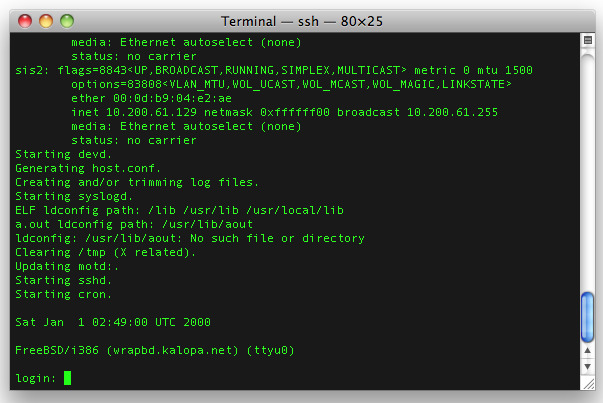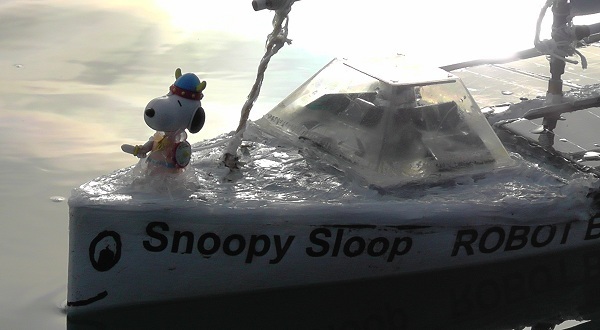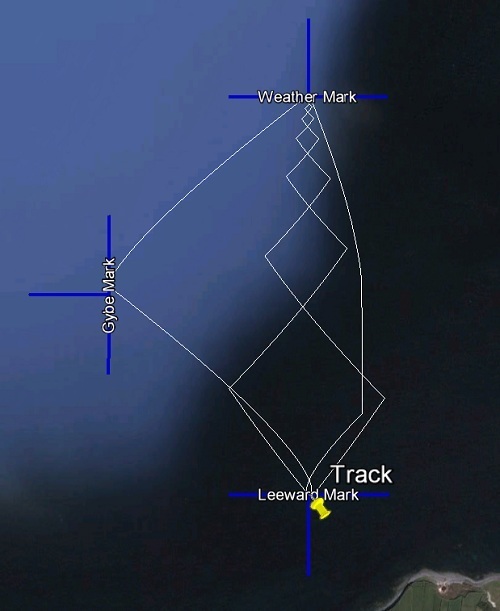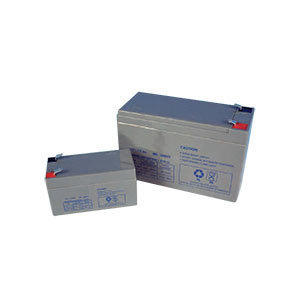
Hello to the Little Red Daemon
By Dermot Tynan, almost 13 years ago.
After much tweaking and hacking with configuration files and kernel build options, I finally have a FreeBSD 8.3-RELEASE kernel and install running on a Wrap board. Technically, it's NanoBSD, which is a scaled-down FreeBSD install, which boots from Compact Flash. The WRAP board is the PC Engines forerunner to the ALIX. When National Semiconductor and AMD stopped making Geode chips, the guys at PC Engines had to stop making their very popular WRAP board. I still have a few of them tucked away, for emergencies such as this.

Bon Voyage, Snoopy!
By Dermot Tynan, almost 13 years ago.
Today, March 23rd, 2013, Team Joker are planning to launch their ninth boat, Snoopy Sloop. This has been an educational (and obviously fun!) experience for Robin Lovelock and his fleet of robotic warrior boats. Here in Beoga Beag land, we wish them well.

Of Laylines and Beats
By Dermot Tynan, almost 13 years ago.
This time, I set the simulation granularity a bit smaller, so the updates are more regular and there are more data points, which explains the curved route in some cases. You can click on the image for a slightly larger version. An Olympic course is known to sailors as a "triangle and sausage", because you sail upwind to the top mark, turn onto a broad reach to the gybe mark, gybe around, and broad reach down to the leeward mark. From there you beat back up to the windward mark, and then turn dead downwind to the finish line at the leeward mark. A true Olympic course would put the start and finish line about a third of the way up the beat, shortening the first leg somewhat, but also making for an upwind finish as you would have to sail around the leeward mark and beat to the finish. I skipped all that!

Hello to the Little Red Daemon
By Dermot Tynan, almost 13 years ago.
After much tweaking and hacking with configuration files and kernel build options, I finally have a FreeBSD 8.3-RELEASE kernel and install running on a Wrap board. Technically, it's NanoBSD, which is a scaled-down FreeBSD install, which boots from Compact Flash. The WRAP board is the PC Engines forerunner to the ALIX. When National Semiconductor and AMD stopped making Geode chips, the guys at PC Engines had to stop making their very popular WRAP board. I still have a few of them tucked away, for emergencies such as this.

Battery and Solar Design
By Dermot Tynan, almost 13 years ago.
There will be at least two Vcc busses on board. Labeled, oddly enough, as Vcc1 and Vcc2. The difference between them is that Vcc1 is always on, at all times, and Vcc2 (through VccN) are selectable by Igor.
The main processor runs off Vcc2, but Igor (and Otto) both run off Vcc1. In situations where voltage levels are critical, Vcc2 will be switched off and the boat will continue on whatever course had previously been set, until either voltage levels are healthy, the specified "wake-up" time has elapsed, or there are critical issues which require Mother to get involved. A critical situation could be something like a dramatic wind shift, or an error such as a mis-reading from a sensor.
Upcoming Missions
- Galway Bay Loop, Waiting for Vessel Availability
Search
Recent Posts
- May 2023 (1 post)
- April 2023 (1 post)
- March 2023 (1 post)
- February 2023 (2 posts)
- March 2022 (3 posts)
- March 2021 (1 post)
- August 2020 (1 post)
- May 2019 (1 post)
- April 2018 (1 post)
- November 2017 (1 post)
- April 2017 (1 post)
- November 2016 (1 post)
- September 2016 (1 post)
- August 2016 (1 post)
- January 2014 (2 posts)
- October 2013 (7 posts)
- September 2013 (1 post)
- August 2013 (3 posts)
- June 2013 (3 posts)
- May 2013 (4 posts)
- April 2013 (3 posts)
- March 2013 (9 posts)
- February 2013 (8 posts)